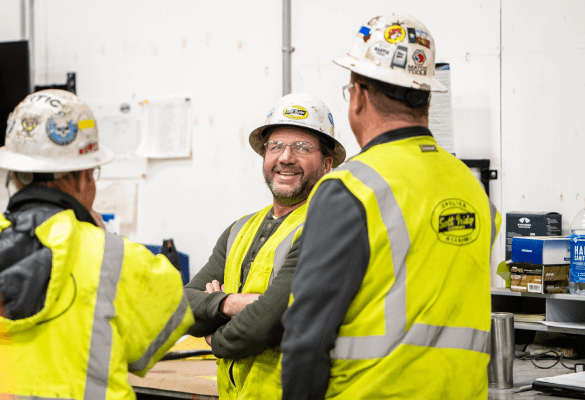Individual Responsibility
Written by Dave Turin • Reviewed by Laura Meyer
June 2, 2022
"In Team Building, it’s all of our responsibility to be a part of the team." - Dave Turin
Each individual must know the goals and the rules the team lives by.
It’s easy to point to leadership roles and the weight of responsibility that leaders bear, but truly successful teams work top-down and bottom-up. The leaders need the individuals as much as the individuals need the leaders.
Empower, Encourage, and Embrace the Team
So how does individual responsibility look in the day-to-day? There are a few key things to remember.
Communicate
Communicating is the single most important aspect of team culture. It’s the responsibility of the leadership to make the rules of the team very clear, but it’s on the individuals to know their playbook inside and out and to clarify any misunderstandings by asking questions at the appropriate time.
For leaders, listening is as important to communication as speaking. Like with a football team, the coach brings the playbook, but it’s ultimately the quarterback who has to call the play on the field. Everyone has to get behind the mission of the team, as communicated by the coach.
Each individual is responsible for
- Being a team player
- Listening to leaders
- Knowing the rules
- Living up to them
- Taking the team seriously
Communicating isn’t purely out of necessity, either. On a great team, individuals empower, encourage, and embrace each other on a daily basis—without discriminating between personal and professional problems
Train
What do teams do? By definition, they train. In a sport, each person on the team has to show up for practice and participate wholeheartedly in the job at hand. In construction, practice is the work you do on the jobsite every day.
On a successful team, every individual consistently looks for ways to improve and shares their insights with fellow team members.
Go All-In
Dave Turin’s team has the attitude of all-in. “When everyone’s all-in, you’re going to be successful. It’s not just all-in for success; all-in means you’re all-in as a team and all-in with each other.”
That’s why it’s so important to connect with your team. Dave’s team has a morning meeting every day. They spend 75% of it talking about what’s going on with each person and only about 1/3 of the meeting is about the work. They ask each other about their families, their bills if the bills are getting paid, and how they can help each other. “If one of my guys is having an issue at home that detracts from work, we have to address that.” Going all-in for the team means bringing yourself fully to the relationships, not being all-in for one outcome.
“If someone has a problem, we have to fix that as a team. All-in means taking care of each other. If you get a call, and your wife is at home with a broken-down vehicle, and you’re not there to fix it, you need to address that. Because you can’t go all-in with something like that on your mind.”
It’s not just all-in to win a game or get a lot of gold, it’s about being all-in as a family.
Speak Up When Appropriate
“If you’ve got a better way to back the truck up and get it loaded, speak up!” There are always going to be times when you need to put your head down and finish out a task, and it’s on the individual to know when the timing is right. But if you have an observation that will help the team reach their goals, speak up!
Being all-in means you trust the leader of the team to listen to you, and the leader trusts you to speak up when you have an observation that they may have missed, especially when your insight could aid the team.
Speaking up doesn’t mean complaining about everything or always calling out problems, it means having a desire to help your whole team, and being brave enough to say something when necessary.
Top-Down and Bottom-Up
Knowing the team’s playbook, goals, and rules is your number one responsibility as an individual.
Developing a family setting where people know what is expected of them is a task for everyone on the team. Adhering to the rules while being bold enough to communicate with your leadership team, going all-in with your team, and building up your team members (including leaders) when they need it is all a part of the individual’s job when it comes to creating a successful team.
Check out Dave’s next lesson, Leaders’ Responsibility.
More about
Sand Cone Test for In-Place Density Testing Soil by Sieve - Minus #40 5 Heavy Equipment Maintenance TipsMeet the Expert
Dave Turin
DAVE TURIN is a civil engineer who embarked upon his pursuit for gold as part of the hit reality show GOLD RUSH and currently is the star of DAVE TURIN’S LOST MINE on Discovery Channel. Although Dave has worn many hats and operated various pieces of heavy equipment throughout ten seasons of gold mining, it was the extensive hours he spent bulldozing that acquired him the name “Dozer Dave”. Dave grew up in the foothills of the Mt. Hood wilderness in Oregon, where he cultivated a love for the outdoors while hunting and fishing. This is also where he began spearheading his family’s successful rock quarry business along with his father and three brothers. Dave has a desire to encourage young people to work hard, to resist giving up in the midst of adversity, and to be bold in trying new things. He feels the trades are a viable option for many and is a proponent of addressing the skills gap and labor shortages in that industry. Viewers of GOLD RUSH worldwide have witnessed Dave’s successes, failures, frustrations, persistence, and his ability to bounce back even stronger than before. Dave never shies away from a challenge. As a football enthusiast he has learned to tackle obstacles head on, using his experience and intelligence in the construction field to gain success. When Dave isn’t moving rocks and pursuing gold responsibly he enjoys spending time with his family and playing golf.














